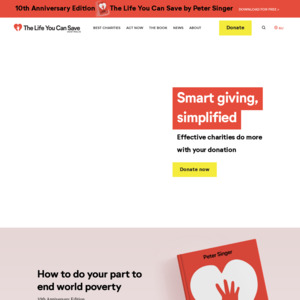Updated in 2019 and released for free as both an eBook (mobi, epub or pdf) and an Audiobook (read by a bunch of celebrities). Description from the website:
About the book
10th Anniversary Edition of The Life You Can Save by Peter SingerA Compelling Book That Inspires and Empowers People to Act Now to Address Global Poverty
In 2009, Peter Singer wrote the first edition of The Life You Can Save to demonstrate why we should care about and help those living in global extreme poverty, and how easy it is to improve and even save lives by giving effectively. Peter then founded a nonprofit organization of the same name, The Life You Can Save, to advance the ideas in the book. Together, the book and organization have helped raise millions of dollars for effective charities, supporting work protecting people from diseases, restoring sight, avoiding unwanted pregnancies, ensuring that children get the nutrients they need, and providing opportunities to not only survive but thrive.In the decade since the first book’s publication, dramatic progress has been made in reducing global extreme poverty. However, millions still live on less than $1.90 a day, and there is yet much to be done.
To address the continuing need, and to build on the success of the first edition, Singer acquired the book rights and updated the content to be current and even more relevant. With mission-aligned celebrity narrators and by giving away the audiobook and e-book for free (in addition to having it available for purchase through traditional e-commerce and retailers), the 10th-anniversary edition of The Life You Can Save aims to inform, inspire and empower as many people as possible to act now and save lives.
Personally, it's no understatement to say that this book changed my life. Its central thesis is deliberately provocative:
- First premise: Suffering and death from lack of food, shelter and medical care are bad.
- Second premise: If it is in your power to prevent something bad from happening, without sacrificing anything nearly as important, it is wrong not to do so.
- Third premise: By donating to aid agencies, you can prevent suffering and death from lack of food, shelter and medical care, without sacrificing anything nearly as important.
- Conclusion: Therefore, if you do not donate to aid agencies, you are doing something wrong.
Singer spends a lot of the book defending (often valid) arguments against this conclusion, and comes to the practical recommendation that we take the pledge to donate a small percentage of our income to effective charities. Suggested percentages are realistic, starting at:
- Under AUD$50,000: whatever you feel you can afford without undue hardship.
- $50,000-$120,000: 1% of your income
- Over $120,000: 1% of the first $120,000, 5% of the next $90,000, 10% of the $260,000, 15% of the next $$, etc.
No matter your thoughts on effective altruism, the book is a fascinating read that I'd highly recommend giving a go. And it's free!
![[eBook, Audiobook] Free - The Life You Can Save by Peter Singer](https://files.ozbargain.com.au/n/40/519840.jpg?h=38f2917e)

Already disagree. Hard no from me.
The economic and political/democratic systems globally are fundamentally broken. I won't be supporting the intentional system of privitising profits for the few in power and socialising the losses for everyone else.
It shouldn't be about us supporting the broken system by donating. If we aren't staying educated on significant issues, being critical of evidence and holding our elected leaders accountable by making our voices heard and taking real action which disrupts the economy/profits, then you are actually doing something wrong.
¯\_(ツ)_/¯